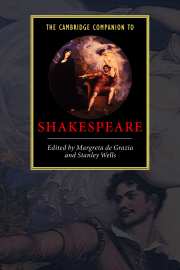Book contents
- Frontmatter
- 1 Shakespeare’s life
- 2 The reproduction of Shakespeare’s texts
- 3 What did Shakespeare read?
- 4 Shakespeare and the craft of language
- 5 Shakespeare’s poems
- 6 The genres of Shakespeare’s plays
- 7 Playhouses, players, and playgoers in Shakespeare’s time
- 8 The London scene
- 9 Gender and sexuality in Shakespeare
- 10 Outsiders in Shakespeare’s England
- 11 Shakespeare and English history
- 12 Shakespeare in the theatre, 1660-1900
- 13 Shakespeare in the twentieth-century theatre
- 14 Shakespeare and the cinema
- 15 Shakespeare on the page and the stage
- 16 Shakespeare worldwide
- 17 Shakespeare criticism, 1600--1900
- 18 Shakespeare criticism in the twentieth century
- 19 Shakespeare reference books
- Index
3 - What did Shakespeare read?
Published online by Cambridge University Press: 28 May 2006
- Frontmatter
- 1 Shakespeare’s life
- 2 The reproduction of Shakespeare’s texts
- 3 What did Shakespeare read?
- 4 Shakespeare and the craft of language
- 5 Shakespeare’s poems
- 6 The genres of Shakespeare’s plays
- 7 Playhouses, players, and playgoers in Shakespeare’s time
- 8 The London scene
- 9 Gender and sexuality in Shakespeare
- 10 Outsiders in Shakespeare’s England
- 11 Shakespeare and English history
- 12 Shakespeare in the theatre, 1660-1900
- 13 Shakespeare in the twentieth-century theatre
- 14 Shakespeare and the cinema
- 15 Shakespeare on the page and the stage
- 16 Shakespeare worldwide
- 17 Shakespeare criticism, 1600--1900
- 18 Shakespeare criticism in the twentieth century
- 19 Shakespeare reference books
- Index
Summary
Warwickshire illiterate; supplier of story-lines to the groundlings; Renaissance polymath. You show me your Shakespeare, and I'll show you a hypothesis about the size and character of his library. We have no hard facts about Shakespeare the reader: no personal documents, no inventories, no annotated volumes with his bookplate. And though his dramatic characters often turn up with books in their hands (sometimes merely pretending to read them), we have no neatly autobiographical equivalent of the opening moment in Sir Philip Sidney's Astrophil and Stella, where the struggling poet consults pages from his predecessors' work. The impossibility of answering the question only adds to its allure, promising to tell us both who Shakespeare was and how he wrote. Do we see the collected works as the product of an uncanny alchemy of sophistication and complexity performed by a provincial with moderate education and limited book-learning? Are they the output of an extraordinarily hard-working craftsman who had a knack for taking what was mostly second-rate contemporary writing and transforming its superficial excitements into more profound forms of high sensation? Or should we accept the proposition that the plays and poems represent a full engagement in the high culture of early modern Europe? In these responses to the matter of Shakespeare’s reading one can trace both the history of his reputation and the changing fashions of his critics.
- Type
- Chapter
- Information
- The Cambridge Companion to Shakespeare , pp. 31 - 48Publisher: Cambridge University PressPrint publication year: 2001
- 12
- Cited by



